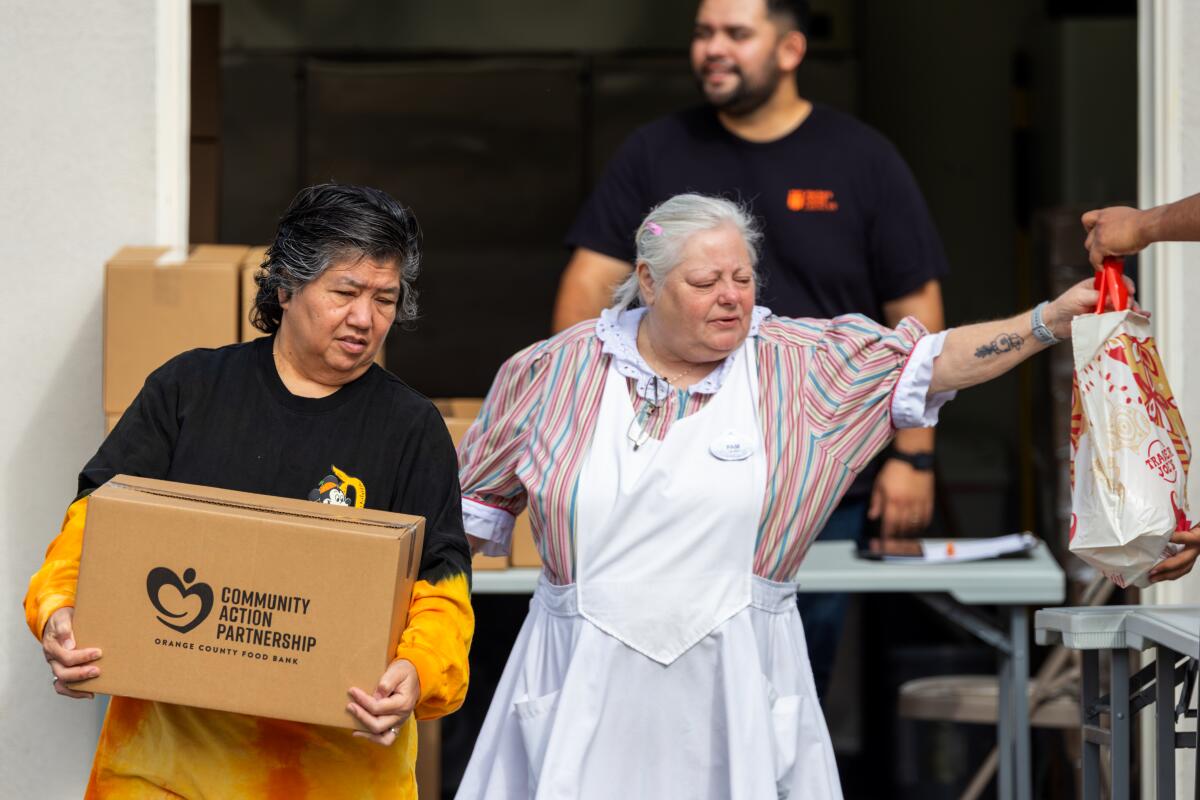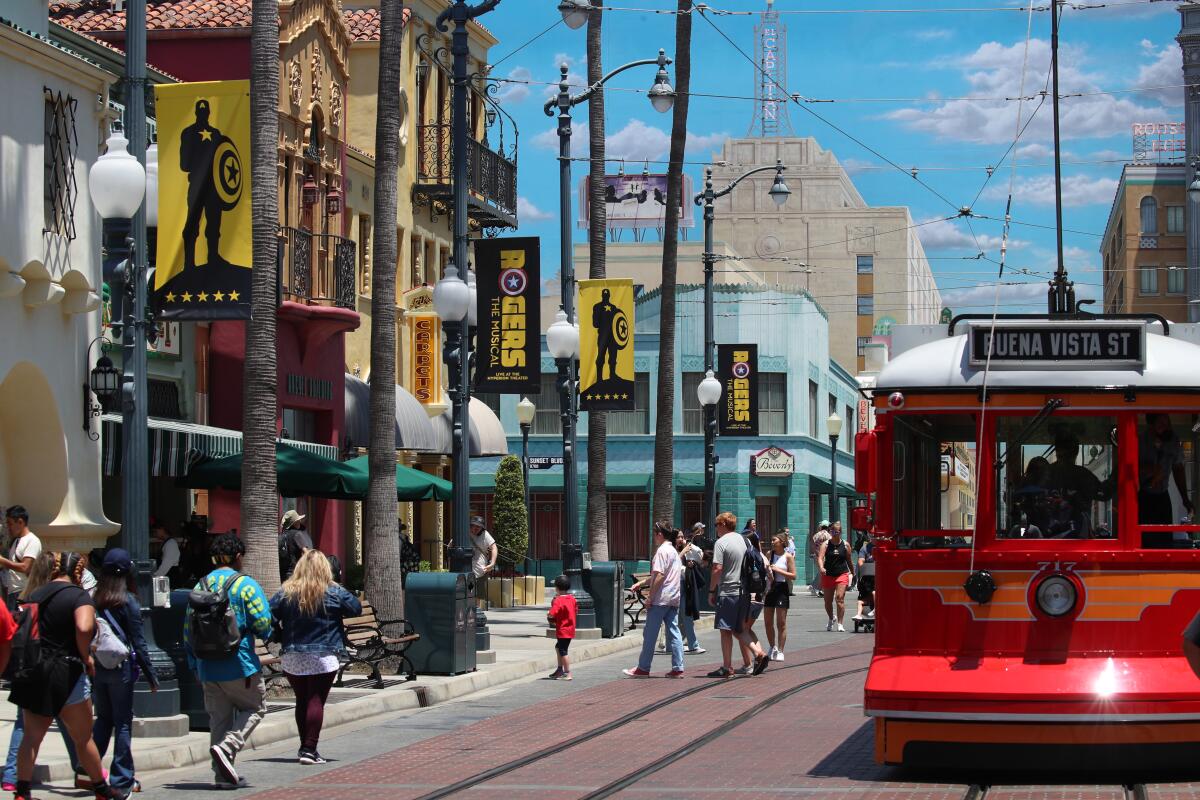Marlene Hackett works most days in Disneyland at food stands in Critter Country, where she rolls the theme park’s famed churros in brown sugar and shovels buttery popcorn into buckets before handing them out to eager parkgoers.
But with an hourly wage of $21.25 after 13 years as a Disney “cast member,” Hackett, 53, struggles to keep her own cupboards full. So, shortly after dawn on a recent Friday, she was among scores of theme park workers picking up boxes filled with canned goods, pasta, bread and tortillas at a monthly food bank hosted by Workers United Local 50, Disney’s largest labor union.
Yadira Damacio was among scores of Disney employees who visited an October food bank hosted by Workers United Local 50.
(Irfan Khan / Los Angeles Times)
Throughout the morning, a steady flow of cars pulled up in the alley behind the union’s office, about a mile and a half from the theme park. Disney workers, some wearing double-breasted white chef’s jackets, others in aprons, scanned their employee ID cards at a check-in desk and humbly accepted the donated staples before heading off for morning shifts at the “happiest place on Earth.”
Local 50 represents 8,500 food and beverage workers at Disneyland and the adjacent California Adventure Park. Many, like Hackett, are grateful for the pantry. She said the effort helped keep her family fed when she was out for several months for knee replacement surgery. And now that she’s back at work full time, inflation has continued to eat at her food budget.
“It’s crazy, but the food bank helps a great deal,” Hackett said.
So, too, will a major legal victory handed down last month by the California Supreme Court that is expected to boost pay for thousands of low-wage Disney workers.
On Oct. 25, the justices said they would decline to hear an appeal by the Walt Disney Co. in a long-running class-action lawsuit that alleged Orange County’s largest employer was wrongfully skirting a living-wage ordinance passed by Anaheim voters in 2018. The decision cemented a July appellate court ruling that found the law indeed applied to Disney’s two Anaheim theme parks and resort workforce.
“We don’t have a precise measure of the damages,” said Sarah Grossman-Swenson, an attorney representing workers at Disney’s Anaheim properties, “but we do expect that it will be in the tens of millions of dollars.”

Maggie Agrusa, left, and Pamella Graves collect groceries from one of the food banks Workers United Local 50 hosts monthly. Disney employees say inflation has cut into their food budgets.
(Irfan Khan / Los Angeles Times)
A Disney spokeswoman said the company is still trying to determine exactly how many workers will be affected and how much back pay is owed. But she said raises in line with the city’s living-wage ordinance would show up in the paychecks of eligible workers starting this week.
Javier Terrazas works as a banquet server at the Disneyland Hotel and was a plaintiff in the class-action suit. Disney workers such as Terrazas, eligible for patron tips, are currently paid an hourly rate of $15.50 an hour, the state’s mandated minimum wage. As a group, this category of workers stands to benefit the most from the Supreme Court’s decision not to hear the case — and Disney’s decision to stand down.
“I have multiple jobs, because I can’t make ends meet with what Disney pays me,” Terrazas said. “With this victory, I’ll be able to spend more time with my family and I can just focus on my main job with Disney.”
According to MIT’s living-wage calculator, a working adult with no children needs to earn $21.53 an hour to cover basic living expenses in Southern California. The minimum wage required under Anaheim’s 2018 ordinance is now $19.40 an hour. That’s slated to rise another 50 cents next year.
For eligible Disney workers, back pay will date to January 2019, when the law took effect.
The cessation of the legal battle marks a watershed moment in a tortuous five-year effort to raise the standard of living for resort workers in Anaheim.
In 2018, the Coalition of Resort Labor Unions launched a living-wage movement for Disney workers that included calls for a local ballot measure to raise minimum pay. At the time, the lowest-paid workers at Disney’s Anaheim properties were making $11 an hour, then the state-mandated minimum for large employers.

Low-wage workers at Disney’s Anaheim theme parks are in line for major salary boosts after the company lost a long-running legal battle to circumvent the city’s living-wage ordinance.
(Allen J. Schaben / Los Angeles Times)
In an effort to sidestep the ordinance, Disney negotiated a new pay scale that raised the minimum salary to $15 an hour for employees covered by the Master Services Council, an alliance of four unions that together represent 9,500 workers, about a third of Disney’s unionized workforce.
In ensuing months, other unions, including Workers United Local 50, negotiated similar deals. But even as those contracts were being negotiated, Anaheim voters approved Measure L, the November 2018 ballot measure requiring resort businesses that receive a city subsidy to pay a minimum wage that rises along a set tiered schedule. Under the ordinance, the local minimum wage started at $15 in January 2019, then rose by $1 an hour each year until 2022, when it hit $18. After 2022, raises are based on the cost-of-living index.
In the lead-up to the election, Disney asked the Anaheim City Council to shred two major tax break deals the company had been granted, one involving taxes on gate revenue, the other involving bed taxes on a luxury hotel project. With those agreements canceled, Anaheim’s city attorney said Measure L would not apply to Disney.
But a class-action lawsuit filed against Disney in December 2019 on behalf of 25,000 resort workers said the ordinance did apply because of another complex agreement Disney had with the city involving bond sales to fund an ambitious 1996 theme park expansion.
An Orange County Superior Court judge originally sided with Disney before a three-judge panel overturned that ruling, saying the bond sales agreement qualifies as a city subsidy. Disney appealed the case to the state Supreme Court in August. After justices declined to hear the case, Disney said through its attorneys that the company would comply with Anaheim’s ordinance.
Although the court victory has lifted spirits, for many Disney workers pressing concerns remain. In recent months, discontent has bubbled beneath the surface in Local 50 and other union shops, with members accusing union leaders of failing to effectively represent their interests. Along with higher wages, workers say they want changes in a pay scale that does not reward seniority and sets a high bar for paid sick time.
Rafael Rendon, a custodian at Disney’s California Adventure Park, has talked to fellow SEIU-USWW members as a shop steward to see what matters most to them ahead of the Master Services Council’s upcoming contract negotiations. Thanks to the court victory, many custodians, bakers, ride operators and retail workers represented by the union will see raises and back pay. Rendon estimates that at least half of SEIU-USWW’s membership will benefit.
But pay remains an urgent issue.
“Inflation is hitting very hard,” Rendon said. “Members want to see a very large wage increase to upward of $30 an hour.”

With the holidays approaching, Workers United Local 50 officials say they expect their monthly food banks to get more crowded. They are lining up donated hams and turkeys for union members.
(Irfan Khan / Los Angeles Times)
Workers United Local 50, which is not part of the Master Services Council, did not count on the court fight ending any time soon and negotiated a new contract in August. Union leaders touted an immediate 30% average boost in pay, with an overwhelming majority of workers set to earn additional raises throughout the five-year life of the contract.
But a razor-thin ratification of that contract — and an ugly act of vandalism the day voting began — underscored the internal tensions. Graffiti scrawled across the back walls of the Local 50 office appeared to call out the union president and vice president by name with vulgar taunts and slurs. Anaheim police are investigating the incident as felony.
At the union’s October food bank, Olivia Eliseo, a busser at California Adventure’s Lamplight Lounge, called the vandalism “horrible.” But as she loaded food into the trunk of her car, she recounted her reasons for voting against the contract. Among them: Her job was among the “tipped” positions that did not get pay increases in the most recent contract.
With Disney now poised to adhere to Anaheim’s living-wage ordinance, Eliseo’s fortunes have changed. She is slated to receive an immediate 25% raise and a check for back pay that should be bigger than most. “That would be nice,” she said with a chuckle. “I will probably just save the money so I could maybe one day buy a house.”
In the meantime, with the holidays approaching, Local 50 expects its monthly food banks to get more crowded. Union leaders are lining up donations of turkeys and hams in hopes of meeting demand.

